As I write this today, it is 6 November, 2015, Papa’s 71st birthday. Ma’s is 12 November. Since she went away, we have had a few birthdays in the family, but this is the time she will be missed the most. Varun, Dabloo’s son, was born on 25 September. His birthday starts the season of birthday celebrations for us every year. 24 October is Malvika’s (she is my daughter) birthday, Devika (Dabloo’s daughter) was born on 25 September, Papa on 6 November, Ma on 12 November, and Bhavya, my wife, on 15 November. As you can see, it is a busy season for us.
When her reports came back with such positive news last September, it worked out very well for all of of us. Her chemo sessions didn’t stop, but the sheer positivity of her results kept her – and us – in high spirits. We tend to get together with a group of family and friends every weekend anyway. Her news, the birthdays in our family, and our general tendency to socialize and enjoy life, all combined to produce a mostly happy, frothy three-month period. What had happened to us, in retrospect, was that the inevitability of her terminal illness had weakened its hold on our imagination. She had received treatment, it had not been pleasant, but she was better now. We had been so prepared for the worst that the delay in its arrival made us hope for the best. What if she was one of the 5% of patients with her type of cancer who were still alive five years after their diagnosis? It was a small chance, but it was possible. That possibility was what we hoped for.
Ma continued to meditate, and her chemo continued. The next checkpoint for her condition would be in the middle of November. Her weight was constant, and she was in good spirits. Her hair, which had withstood the barrage of chemo until that time had now begun to thin. As it got to the stringy, almost-not-there stage, she decided that she wasn’t going to wear a wig. Her hair-loss had been come by honestly, so she was going to wear a bandanna, if anything. That way, there was no pretense that she was not what she was – a very sick woman receiving treatment for her cancer.
Our round of birthday parties started. Ma participated as much as she could. Her ability to stand and cook had become much diminished, but she would still sometimes cook food she knew we loved from our distant childhood. Here she is:
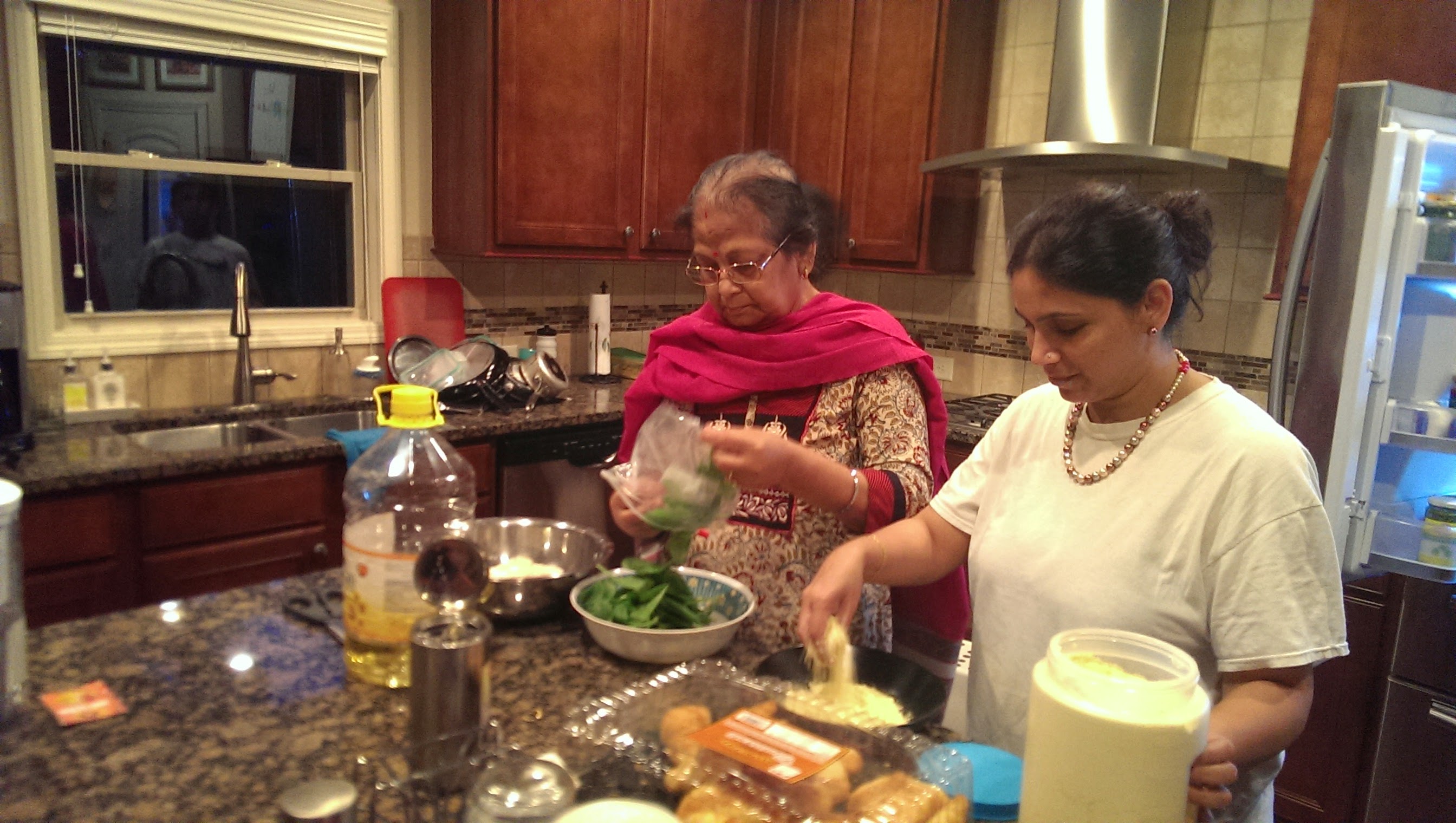
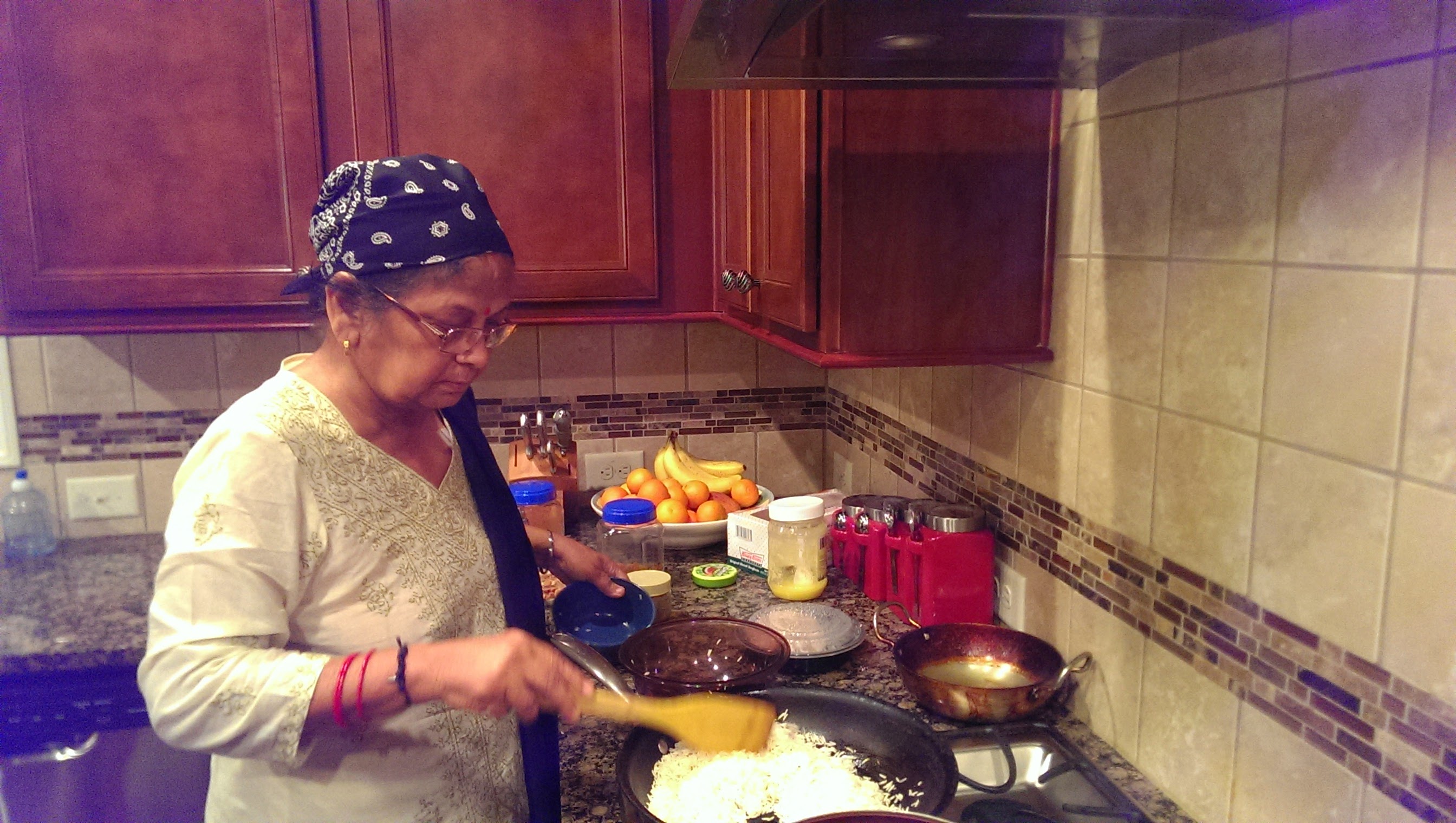
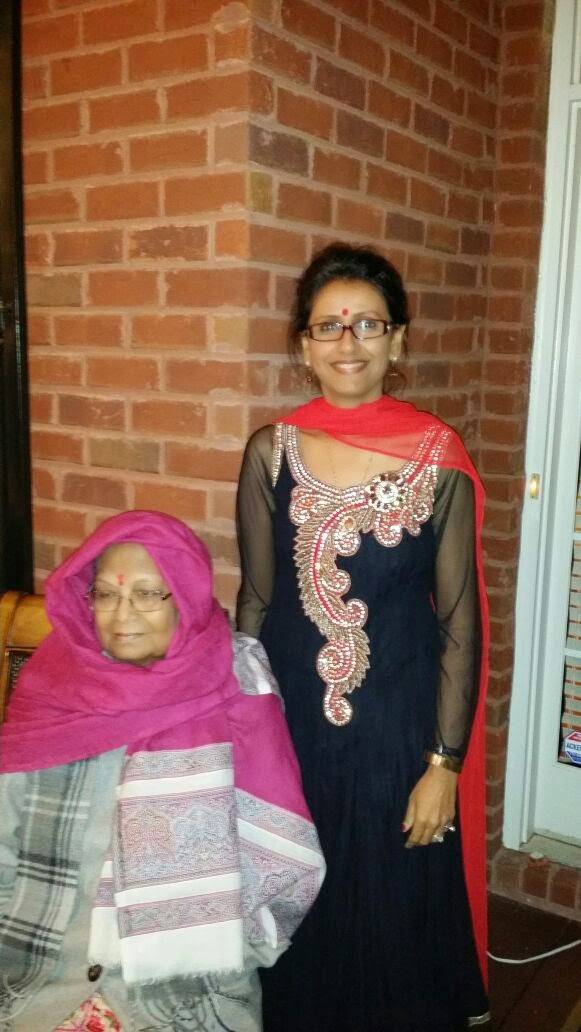
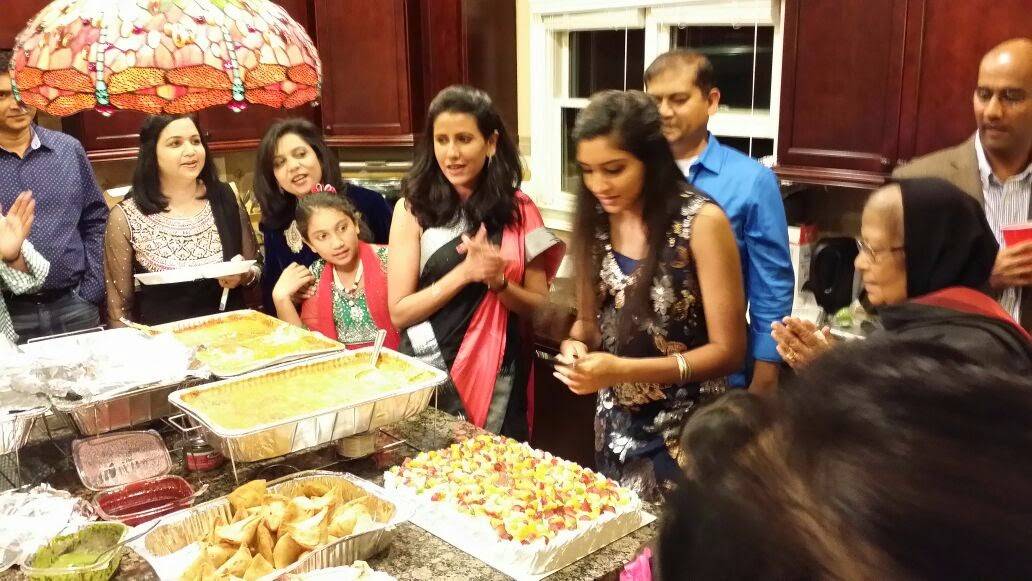
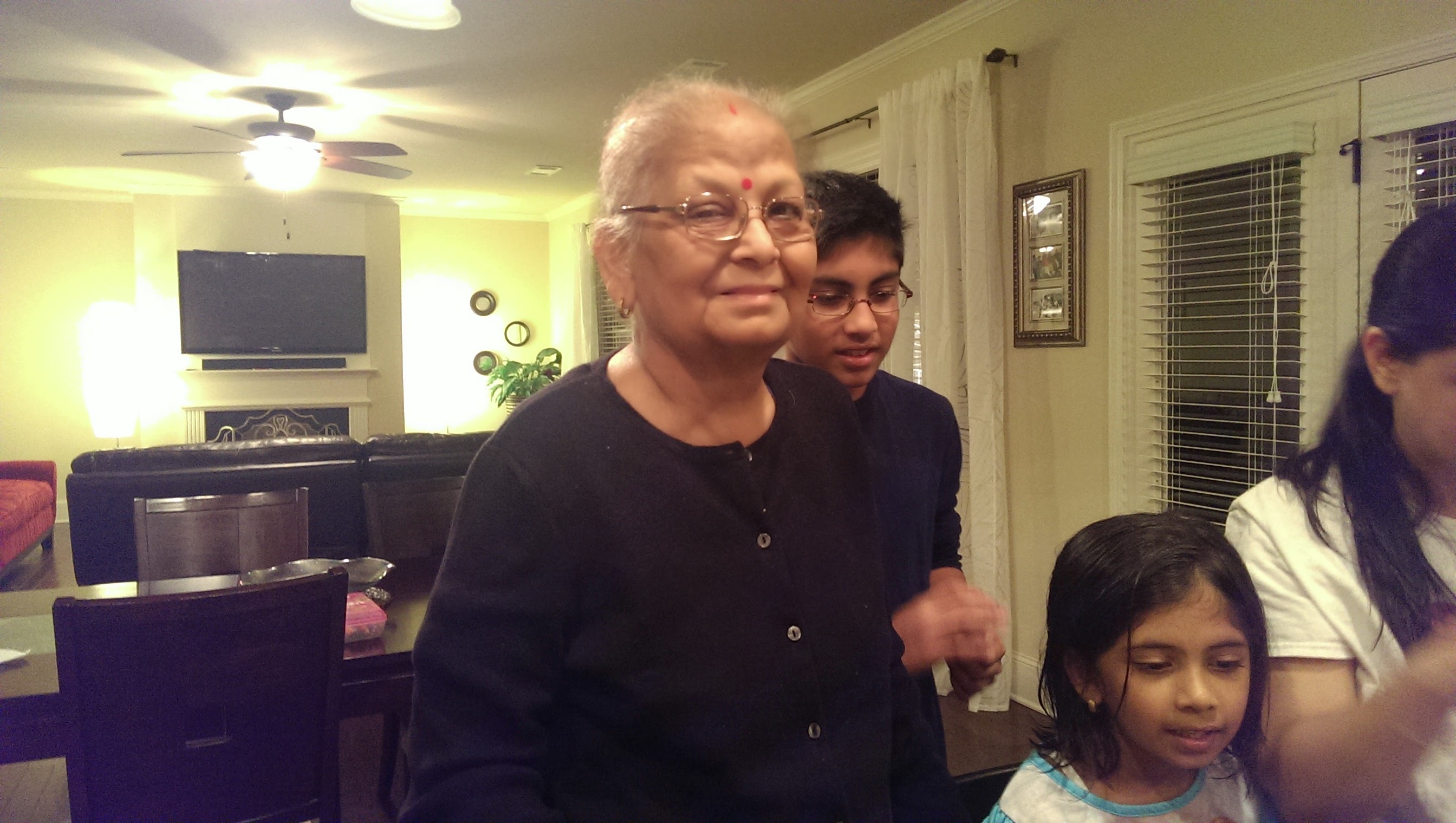
Ma never really wanted to go back to India while her treatment was in progress. Her attitude was that her entire family was with her, here in Atlanta, and she didn’t really need much else. Her house in Delhi, into which my parents had moved only the year before after waiting five years for it to be finished, was a sprawling, beautiful structure, but she would be alone there if she did go back. As far as she was concerned, she was where she wanted to be.
Papa, on the other hand, was itching to visit India. He had tax and bank issues he needed to handle. His physical presence would make it much easier to traverse the minefield of rules and regulations that are in place in India. I wasn’t a big supporter of the idea, but we talked to Ma’s oncologist, Dr. Krishnamachari, and he reminded us that the purpose of the treatment she was receiving was not to keep her close to the hospital, but to allow her to to do what she wanted or needed to do. His suggestion was to go to India if it was needed, because there was no reason not to. Ma was well enough to withstand the journey.
Ma’s CAT scan in the third week of November came back generally clear, except for a small new growth on the left side of her neck. The general medical opinion was that she was stable, and that the growth could be nothing to worry about.
Against that background, Ma, Papa, and I set out for Delhi on 26 November, 2014. We were on Lufthansa. Our journey to India was comfortable. We reached Delhi early in the morning on 28 November. After a few hours of sleep in our beds, we were up and about.
Late November in Delhi is still warm by American standards. The sun was out, and the temperature was in the 15-20 degree celsius range. Ma was in her element, walking around the house, ordering the domestic staff to cook this or clean that, and generally getting back to living in a way that she had been used to for many years, except when she was with us in America, with its lack of domestic help.
Traffic was horrendous in Gurgaon, the area where my parents have their house. In the evening of the 28th, Papa decided that we should get in the car and drive to his club, which was about 6 kilometers away. This drive used to take them about 20 minutes before they had left India. That evening, we had to turn back midway because of the slow traffic, and it was two hours before we got back home. Ma never got in the car for her entire stay in Delhi after that!
We started getting visitors. Ma’s mother and brothers arrived with their families. Ma was genuinely happy to see all of them. My grandmother, frail and in her mid-eighties, saw her husband die of cancer back in 1982, and a son succumb to it in 2005. She was very concerned about my mother’s prognosis, and kept telling her how many gods and goddesses she was going to propitiate to ensure Ma’s return to good health. Here they are, enjoying some gentle winter sun:
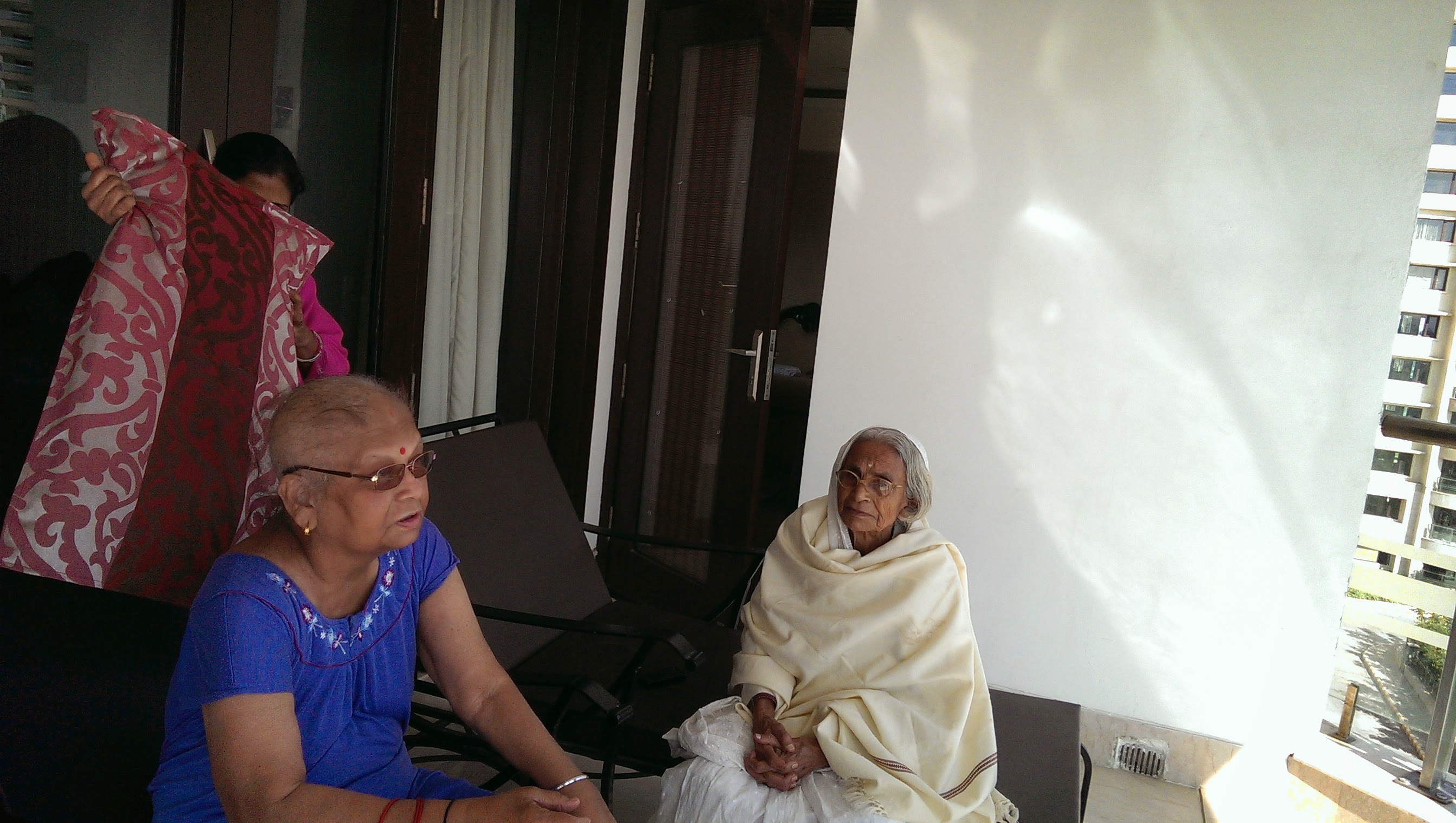
The first 10 days after we landed in India were very pleasant. Ma was receiving many visitors, and it was a happy sight to see her sharing jokes with relatives and friends. Chemo had sapped her of her strength, so she was easily tired, but that wasn’t a concern. She had her favorite Hindi TV serials, her family, her domestic staff, and her beautiful house. Life had gone back to normal for her.
My eyes were constantly looking for signs of a relapse. Whether it was in her gait or in her speech, I kept looking for signs that things were not well. I think I was happy to see her living a normal life, but I didn’t believe it would, or could, last.
The signs appeared slowly. Her appetite remained normal, but I noticed she retched a little one day, right after she had tried to swallow her first mouthful of food. She was able to swallow, and she never threw up, but something had caused her to react badly to using her esophagus.
Over the next 3-4 days, this problem became frequent and severe enough that she wasn’t getting much food into her. She could swallow, but the act of swallowing invariably caused very unpleasant retching. It bothered her enough that she became very reluctant to eat. As one would expect, weakness and fatigue took hold of her.
It was the evening of the 10th of December, and we were supposed to return early in the morning on 13 December, 2014. I told Papa we were going to return immediately, because I didn’t think Ma would last another couple of days at the rate she was weakening. Papa had something he needed to do on the 11th. Hoping that Ma wouldn’t be too ill by then, I changed our tickets to return on the 12th.
My mother’s younger brother, Sudhir Mamaji (Mama is a Hindi term for mother’s brother, and ji is a suffix denoting respect) was with us in those last few days. He dabbles in astrology. On the 10th of December, we were having a conversation about what a fellow astrologer had determined my mother’s fate was going to be according to her horoscope. According to that astrologer, if my mother could last until the end of June 2015, she was going to live a long life. Having seen how fast her health had deteriorated, I filed that information into my memory as ‘interesting but never going to be tested’ – Ma was so sick already that I didn’t think she was going to last a month.
On our last evening in Delhi, as we were waiting to leave for the airport for our 3 am flight, my aunt and uncle visited us to say goodbye. My aunt is my father’s younger sister, and her husband, my uncle, was my father’s classmate at university. When we were growing up, we always lived in company accommodation that was adjacent to each-other. Their son, Rakesh (universally known as Doona) is a month older than me, and their daughter, 6 years younger than me, was treated as the daughter my mother didn’t have. When Papa left India to go to work for L N Mittal’s company, my uncle and aunt also followed after a few years. They are retired now, but they were, and are, very close to us. The day my father called my uncle to tell him about my mother’s diagnosis, my uncle had broken down and Papa told us he had heard him bawling his heart out over the phone.
That evening, when they came, Ma was sleeping. It was about 10 pm, and she was asleep from weakness and exhaustion. She had barely had one full meal over the last 3 days, although we had given her several small portions of soup and food that she had been able to swallow. My aunt went into Ma’s bedroom, where the lights were turned off. The golf course outside is well-lit at that time, and Ma’s room was getting some light from there. I remember, very clearly, my aunt silhouetted against the light from the golf course, going through the steps of a last farewell to Ma. She gave Ma a long hug, touched Ma’s feet as a sign of respect, and, taking care not to wake her, came out of the room. When she stepped out of the room, she was crying.
When we started for the airport, it was just after midnight. The airport security force had been requested to accompany Ma through security and to her flight. I am immensely grateful that that worked very well. A gentleman from the Central Industrial Security Force (CISF) came out to meet us, and Ma was taken through Immigration and Customs in a wheelchair. She was awake and conscious now. We waited in the lounge until our flight was called, and then Ma was taken to the plane and to her seat inside.
What a difference 15 days can make! On her way to India, she had eaten some of the food given to her on the plane, and had also been quite chirpy. On this flight, all she could do was sleep.
At Frankfurt airport, there was a delay in collecting all the passengers who needed help being transported to the terminal from the plane. I had to fight hard to keep my temper in check, as Ma was treated like other people who were reluctant to walk. Yes, it’s true – I know of many middle-aged Indians who will ask for a wheelchair at airports because they don’t like walking. Airport staff tends to assume that they are dealing with at least a few of those reluctant walkers, so their attitude sometimes isn’t all it should be. Eventually, almost 45 minutes after our plane landed, we were in the lounge.
By now, Ma was so weak that her head was rolling this way and that even though she was simply sitting still. I brought her some soup and food, but she point-blank refused to have any of it. After trying to convince her, to no avail, I finally exploded. “Do you know you will die if you don’t eat?”, I said to her in as loud a voice as I could muster. “Is that what you want? Why don’t you make an effort?”, I continued, knowing full well that she was very sick but hoping that I could shake her enough to get her to try.
That had the required effect. She shook off her sense of malaise, and asked me to show her where the food was. We managed to feed her a little soup and some food and fruits.
The flight to Atlanta was long, and the wait to get Ma and Papa through the airport and Immigration was almost 2 hours long. When we left the airport in Dabloo’s minivan, we were caught in Atlanta’s rush hour. Ma drifted in and out of sleep for the next 2 hours, but was feeling very sick again by the time we got to my house.
We made appointments to see her oncologist, who then set up a new PET scan. The new PET scan was conducted on 15 December. We took her to her oncologist, Dr. Krishnamachari, the very next day. The scan had revealed that her cancer had started growing again. Her inability to eat was caused by a tumor outside her esophagus, near her larynx. When she ate and tried to swallow, the tumor touched against her esophagus, triggering the retching instinct. She never threw up, but her eating apparatus was not going to work. Ma’s habit of looking fine while feeling absolutely sick didn’t help her that day. Her doctor prescribed some high-protein liquids, and said that if her condition worsened, she could have a feeding tube inserted into her stomach and be fed through that. We came back that day and tried to feed her the new liquid food, but the results were not satisfactory.
On 18 December, she became confused and disoriented. We took her to Emory Johns Creek, a couple of miles from our house. Her blood tests revealed that her magnesium, potassium, and phosphate levels had dropped. It was determined that the only realistic way to feed her was going to be through a tube. This tube, known as a PEG tube, was placed in her on 22 December.
Just before Christmas, her chemotherapy began again. Dr. Krishnamachari was going to try a new cocktail of drugs, since the original chemo drug had lost its efficacy against Ma’s cancer. The new drugs were going to be Taxol and Fluorouracil. Both of these drugs are quite toxic, and Fluorouracil has to be administered over a period of 48 hours. He decided he was going to start with Fluorouracil first, and then try both together.
The effect of Fluorouracil left her in absolute pain and discomfort. 2 days after the start of chemo, she was feeling a burning sensation throughout her body. Gastric distress, pain, and retching made life worse. This was December, and it was cold, but she asked me to arrange for her to sit outside, in the cold, on our deck. I arranged a bed for her on a deck chair and sat with her, while she writhed in pain, twisting her body, and passing in and out of consciousness. According to her doctor, these side-effects were normal. All I could do was hold her hand and try to comfort her. When that proved impossible, I began to weep in sorrow and frustration. She opened her eyes at that very moment, and realizing I was crying, asked me: “Kyon ro raha hai, beta?” (Why are you crying, my son?). I explained to her that seeing her like this was unbearable, and again, just as she had done all through my life, she told me not to cry, that she was going to be all right. Then she passed out again.
In conversations I had with her later, she had no memory of this episode. I am not surprised in the least. Her entire existence was programmed around providing love and comfort to her family, and especially to me. She didn’t have to know where she was to do what came naturally to her.
Her condition gradually improved over the next couple of days. She was resolute that she was going to fight her cancer. We were horrified by what the treatment involved, and how much pain she had to endure because of it. Was that how it was going to be for the next dose, and the ones after that one?
And so it was that we rolled into 2015. She was still around, so it was a Happy New Year, for sure. But what did this year hold?
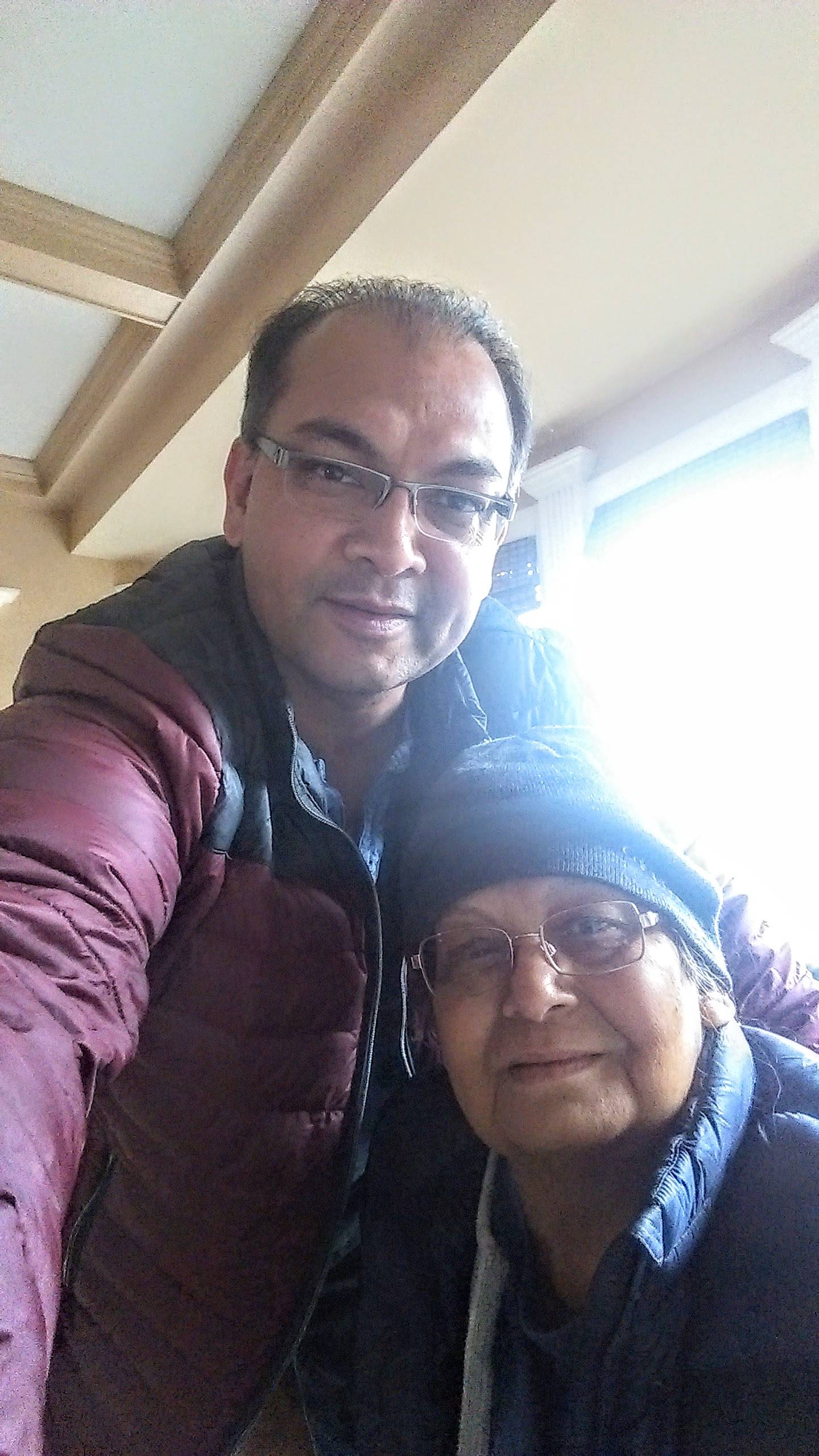
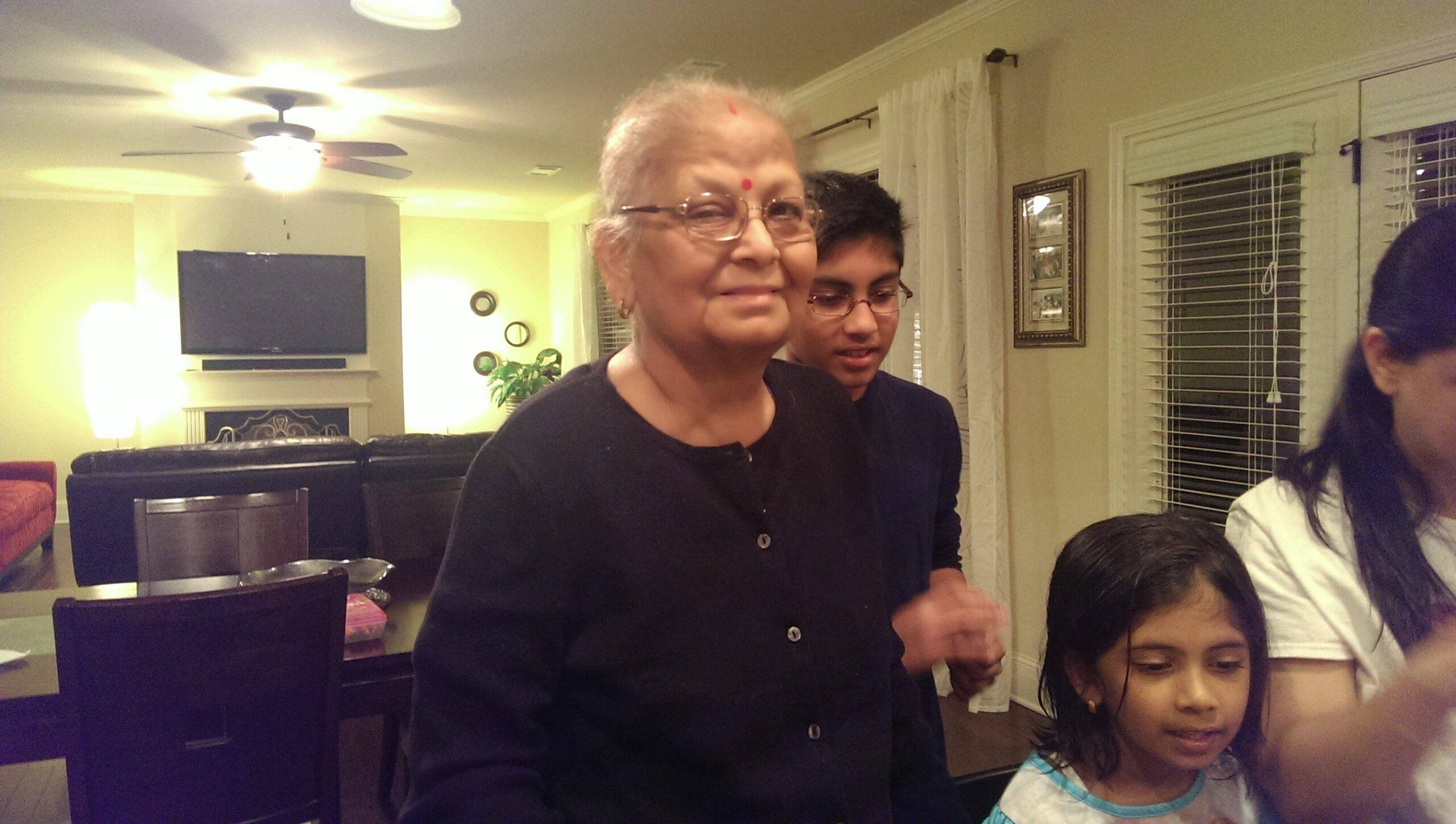
2 responses to “Chapter 5 – The Inevitable Slide Backwards”
Bhaiya… reading this complete article has made me also in tears…. salutes to aunty.s spirits and your perseverance. You have written so well that I could actually visualise each moment. May God bless you all and never ever face such situation…my regards to uncle…..with love Akshat
Written vividly from the core of a loving son’s heart….all that I can say.